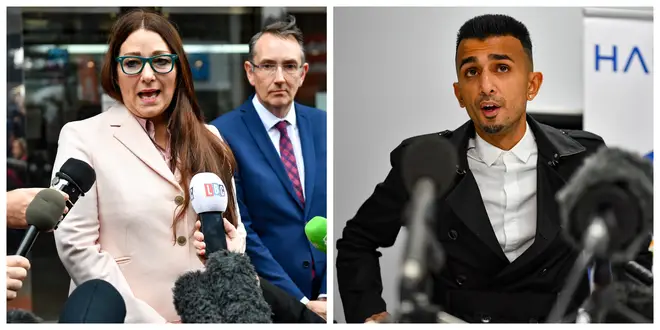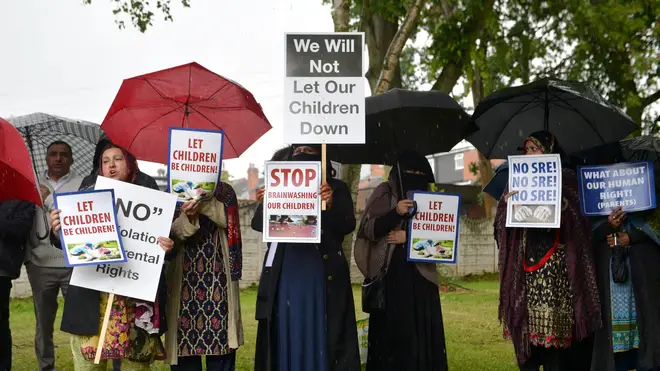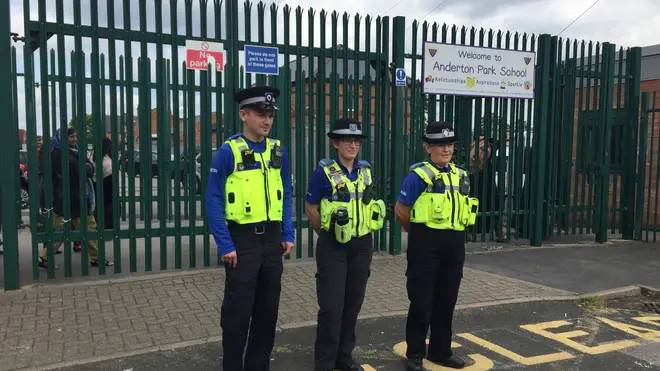
Shelagh Fogarty 1pm - 4pm
26 November 2019, 18:16
The headteacher of a school at the centre of an LGBT protest row has praised a court’s decision to ban noisy demonstrations in the area.
Anderton Park Primary School was thrust into the spotlight earlier this year after parents complained about relationships teaching at the school.
The ban, handed down at the High Court in Birmingham on Tuesday, includes a pre-existing exclusion zone surrounding the buildings.
Head teacher Sarah Hewitt-Clarkson said she was "happy" after the ruling, telling LBC News: “It was thrust upon us, but I don’t mind that.

“I mind the harm [the protests] caused but I don’t mind being in a national conversation about equality because I am absolutely passionate about it.
“It’s an interesting debate to be in the middle of, because even though I’m not LGBT, I am a human being, and therefore discrimination and inequality affects us all in different ways.
“If you’re going to fight for one, you fight for all of it. If one bit is a bit more tricky you don’t leave it out.
“In fact, you should perhaps fight for it a bit more so that it isn’t tricky in the future.”
Mrs Hewitt-Clarkson had previously described the demonstrations as "awful", "toxic and nasty", and has spoken of receiving threats as a result of the gatherings.
The Department for Education and the city council also welcomed the judge's decision.
The legal bid had been opposed by protesters, along with an interim ban first granted at the same court in the summer.
Immediately after the ruling, protester Shakeel Afsar branded the court "one-sided", pointing out that the judge, the council's barrister and key witnesses had been "white", compared with the "diverse" protest supporters.
Speaking at a press conference, he vowed that protests - outside the exclusion zone - would be continuing but was "bitterly disappointed" with the case's outcome.
Birmingham City Council was granted an order temporarily banning protesters from outside the school's gates in June, over safety fears about repeated large-scale demonstrations, often involving people with no direct connection to the school.

The injunction was made against three individuals - the protest's main organisers Mr Afsar, Amir Ahmed, and parent Rosina Afsar, as well as "persons unknown".
Mr Afsar repeatedly claimed the weekly demonstrations, held just yards from classrooms and featuring megaphones and a sound-boosting PA system, were "peaceful".
The self-styled businessman, who has no children himself at the school, claimed protests were only triggered because the head teacher had not properly consulted parents about relationships teaching.
He had argued education material used was not age appropriate, and further claimed the school was "over-emphasising a gay ethos".
Mr Justice Warby QC, handing down the permanent injunction at the High Court in Birmingham, said the protests had "a very significant adverse impact on the pupils, teachers and local residents".

Recounting claims made by speakers at the protests, including one that the school had a "paedophile agenda" and that staff were "teaching children how to masturbate", the judge said: "None of this is true."
Mr Afsar said: "I do regret to say that I feel the court's approach in their case has been very one-sided."
Concluding his remarks, Mr Afsar drew comparison between the "diverse group of people coming together for one cause" in support of the protesters, and others in court.
Mr Afsar said: "Yet when you look at those representing the council and the court, compare faces and backgrounds.
"The judge is white, the council's barrister is white, the council's legal team is white, the teachers who gave evidence were white, the witnesses who gave evidence for the council were white.
"The councillors who misrepresented their voters were white, the police officers who presented witness statements for the council were white.
"A lack of impartiality is unfair and when unfairness affects justice that in itself is injustice."